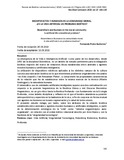Bioartefactos y humanos en la comunidad moral. ¿es la vida artificial un problema bioético?

View/
Date
2018Author
Palabras Clave
Vida Artificial, Singularidad Tecnológica, Roboética, Biotécnica, Bioética ProfundaArtificial Life, Technological Singularity, Roboethics, Biotechnology, Deep Bioethics
Metadata
Show full item recordAbstract
La emergencia de la Vida e Inteligencia Artificial –como parte de los desarrollos, desde 1950 de la disciplina Cibernética-, es un ámbito de estudio pertinente para la indagación bioética respecto del marco de relaciones éticas establecidas entre animales y agentes morales humanos y artificiales inteligentes. La utilización de dispositivos robóticos aplicados a los distintos campos de la cultura concita una valoración bioética en la que intervienen problemas originalmente vinculados –en Aldo Leopold y Van Rensselaer Potter-, a comprender las propiedades características de la relación que ha de establecerse entre la misma esencia de la técnica (Martin Heidegger) y la naturaleza humana. El sistemático uso de entidades artificiales inteligentes supone una des-centralización con respecto a la posición hegemónica de la Bioética Clínica y del Discurso Biomédico Hegemónico, en un giro ético hacia la Bioética Profunda –con fundamento en la Ecología Profunda-, como ámbito disciplinar y reflexivo en el que el hombre abandona su posición antropocéntrica y especista en la taxinomia de lo vivo, a fin de cooperar en forma mutual con agentes no-humanos en la auto-regeneración y/o salud de la biocenosis. El presente estudio indaga, por tanto, sobre los atributos de la relación bioética establecida entre animales y agentes morales humanos y artificiales inteligentes, a partir de la determinación ontológica de la “vida” como “sistema neguentrópico auto-organizado”, en relación con el orden biótico relacional descrito por Arne Naess y con la hipótesis de la “singularidad tecnológica”.
Información Adicional
| Otros Títulos | Bioartefacts and humans in the moral community. Is artificial life a bioethical problem? - Bioartefatos e humanos na comunidade moral. A vida artificial é um problema bioético? |
| Correo Electrónico | gproto@unlam.edu.ar |
| Editor | SaberULA |
| ISSN | 2244-7482 |
| Resumen en otro Idioma | The emergence of Alife and Artificial Intelligence - as part of the developments, since 1950, of the Cybernetic discipline-, is a relevant field of study for bioethical research regarding the framework of ethical relationships established between intelligent human and artificial human beings and moral agents. The use of robotic devices applied to the different fields of culture calls for a bioethical assessment involving originally linked problems -in Aldo Leopold and Van Rensselaer Potter-, to understand the characteristic properties of the relationship to be established between the essence of technique (Martin Heidegger) and human nature. The systematic use of intelligent artificial entities supposes a de-centralization with respect to the hegemonic position of the Clinical Bioethics and the Hegemonic Biomedical Discourse, in an ethical turn towards the Deep Bioethics -based in the Deep Ecology-, as a disciplinary and reflexive field in which man abandons his anthropocentric and specist position in the taxinomy of the living, in order to cooperate in a mutual way with non-human agents in the self-regeneration and / or health of the biocenosis. The present study inquires, therefore, about the attributes of the established bioethical relationship between animals, intelligent human and artificial moral agents, from the ontological determination of "life" as a "self-organized neguentropic system", in relation to the biotic relational order described by Arne Naess and with the hypothesis of "technological singularity". |
| Colación | 101-120 |
| Periodicidad | semestral |
| País | Venezuela |
| Publicación Electrónica | Revista de Bioética Latinoamericana |
| Sección | Revista de Bioética Latinoamericana: Artículos |





